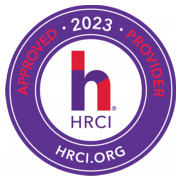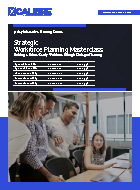| Date | Venue | Fee | |
|---|---|---|---|
| 23 Mar - 27 Mar 2026 | Riyadh – KSA | $ 5,950 | Register Now |
| 27 Jul - 31 Jul 2026 | Dubai – UAE | $ 5,950 | Register Now |
| 21 Dec - 25 Dec 2026 | Dubai – UAE | $ 5,950 | Register Now |
About the Course
This 5-day interactive Strategic Workforce Planning Masterclass training course will equip HR professionals, business leaders, and managers with the knowledge and skills to develop and implement strategic workforce plans aligning with their organisation’s long-term goals. It begins with an introduction to the fundamentals of strategic workforce planning, emphasizing its importance, the key components and objectives of effective workforce planning, and the critical role of HR in this process. It focuses on workforce analysis and talent management, covering techniques for conducting detailed workforce analysis, developing talent management strategies for talent acquisition, development, and retention, and utilising skills inventories and competency frameworks. Delegates will learn to apply data and analytics to make informed talent management decisions and explore succession planning and career pathing as strategic tools.
It emphasizes workforce forecasting and planning, introducing methods and tools for accurate forecasting, scenario planning, and integrating diversity, equity, and inclusion (DEI) principles into workforce planning strategies. A case study will provide practical insights into forecasting future workforce needs in a changing business context dedicated to implementing strategic workforce planning, with guidance on creating actionable plans, applying change management strategies, and using metrics and KPIs for measuring success. Delegates will also explore how technology, including HRIS and workforce analytics tools, can enhance workforce planning efforts and strategies for effective stakeholder engagement and communication.
Furthermore, it will look into the future trends and innovations in workforce planning, discussing the impact of emerging technologies like AI and machine learning, preparing for the future of work, building a resilient and agile workforce, and the importance of continuous learning and development concluding with delegates developing a personalised action plan to implement strategic workforce planning in their organisations. It is designed to provide delegates with a strategic approach to workforce planning that addresses current needs and anticipates future trends, ensuring that their organisation remains competitive and resilient in the face of change.
Core Objectives
The delegates will achieve the following objectives:
- Understand the essential concepts, models, and frameworks of workforce planning, aligning them with organisational strategy and goals
- Employ techniques for detailed supply, demand, and gap analysis to inform talent management strategies effectively
- Develop and apply strategies for talent acquisition, development, retention, and utilisation of skills inventories and competency frameworks
- Apply data-driven approaches and analytics for informed decision-making in talent management and workforce planning
- Master forecasting methods and tools, including scenario and contingency planning, to anticipate and prepare for future business and workforce requirements
- Embed diversity, equity, and inclusion principles within workforce planning to enhance organisational culture and performance
- Explore how HRIS, workforce analytics tools, and emerging technologies can enhance workforce planning and operational efficiency
- Create comprehensive, flexible, and sustainable workforce plans that support strategic objectives and adapt to changing business contexts
Training Approach
The training course is structured around a dynamic and interactive pedagogical approach, incorporating a mix of interactive sessions, case study analyses, and practical exercises tailored to engage delegates actively and foster a deep understanding of the subject matter. They are encouraged to share their insights and experiences through interactive sessions, facilitating a rich exchange of knowledge and perspectives.
Case study analyses provide real-world context, allowing delegates to explore complex scenarios and apply theoretical concepts in practical settings. Practical exercises reinforce learning outcomes, directly enabling them to apply new skills and tools to realistic situations. This comprehensive method ensures a balanced mix of theory and practice, enhancing delegates’ learning experience and preparing them to implement their newfound knowledge effectively in their professional roles.
The Attendees
This training course is tailored for HR professionals, business leaders, and managers who play a pivotal role in shaping their organisation's future workforce.
Likewise, it will be valuable to the professionals but not limited to the following:
- HR Directors and Managers focused on Strategic Planning
- Senior Business Leaders responsible for Organisational Development
- Talent Acquisition and Development Specialists
- Organisational Development and Change Management Consultants
- Project Managers overseeing Workforce-related Initiatives
- Operations Managers seeking to Optimise Team Performance
- Strategy and Planning Analysts involved in Long-term Organisational Planning
Daily Discussion
DAY ONE: OVERVIEW OF STRATEGIC WORKFORCE PLANNING
- Understanding the Importance of Strategic Workforce Planning in Today’s Business Environment
- Key Components and Objectives of Workforce Planning
- Aligning Workforce Planning with Organisational Strategy and Goals
- Workforce Planning Models and Frameworks
- The Role of HR in Workforce Planning
DAY TWO: WORKFORCE ANALYSIS AND TALENT MANAGEMENT
- Techniques for Conducting Workforce Analysis: Supply, Demand, and Gap Analysis
- Talent Management Strategies: Acquisition, Development, and Retention
- Skills Inventory and Competency Frameworks
- Using Data and Analytics for Talent Management Decisions
- Succession Planning and Career Pathing as Strategic Tools
DAY THREE: WORKFORCE FORECASTING AND PLANNING
- Methods and Tools for Effective Workforce Forecasting
- Scenario Planning and Contingency Planning in Workforce Strategy
- Building Flexibility into Workforce Plans
- Integrating Diversity, Equity, and Inclusion (DEI) into Workforce Planning
- Forecasting Future Workforce Needs in a Changing Business Context
DAY FOUR: IMPLEMENTING STRATEGIC WORKFORCE PLANNING
- Creating Actionable Workforce Plans: From Strategy to Execution
- Change Management Strategies for Workforce Planning Implementation
- Metrics and KPIs to Measure Workforce Planning Success
- Leveraging Technology in Workforce Planning: HRIS and Workforce Analytics Tools
- Stakeholder Engagement and Communication Strategies
DAY FIVE: FUTURE TRENDS AND INNOVATIONS IN WORKFORCE PLANNING
- The Impact of Emerging Technologies on Workforce Planning: AI, Machine Learning, etc.
- Preparing for the Future of Work: Skills and Roles of the Future
- Building a Resilient and Agile Workforce
- Continuous Learning and Development as a Strategic Tool
- Developing a Personalised Action Plan for Strategic Workforce Planning in Your Organisation
Certificate Awarded
Upon successful completion of this training course, participants will be awarded a Certificate of Completion from XCalibre Training Centre, acknowledging their accomplishment. This certificate serves as a testament to their dedication to developing their skills and advancing their expertise in their respective fields.

Course Enquiry

A Human Resource Certification Institute (HRCI)® Pre-approved Training Course


